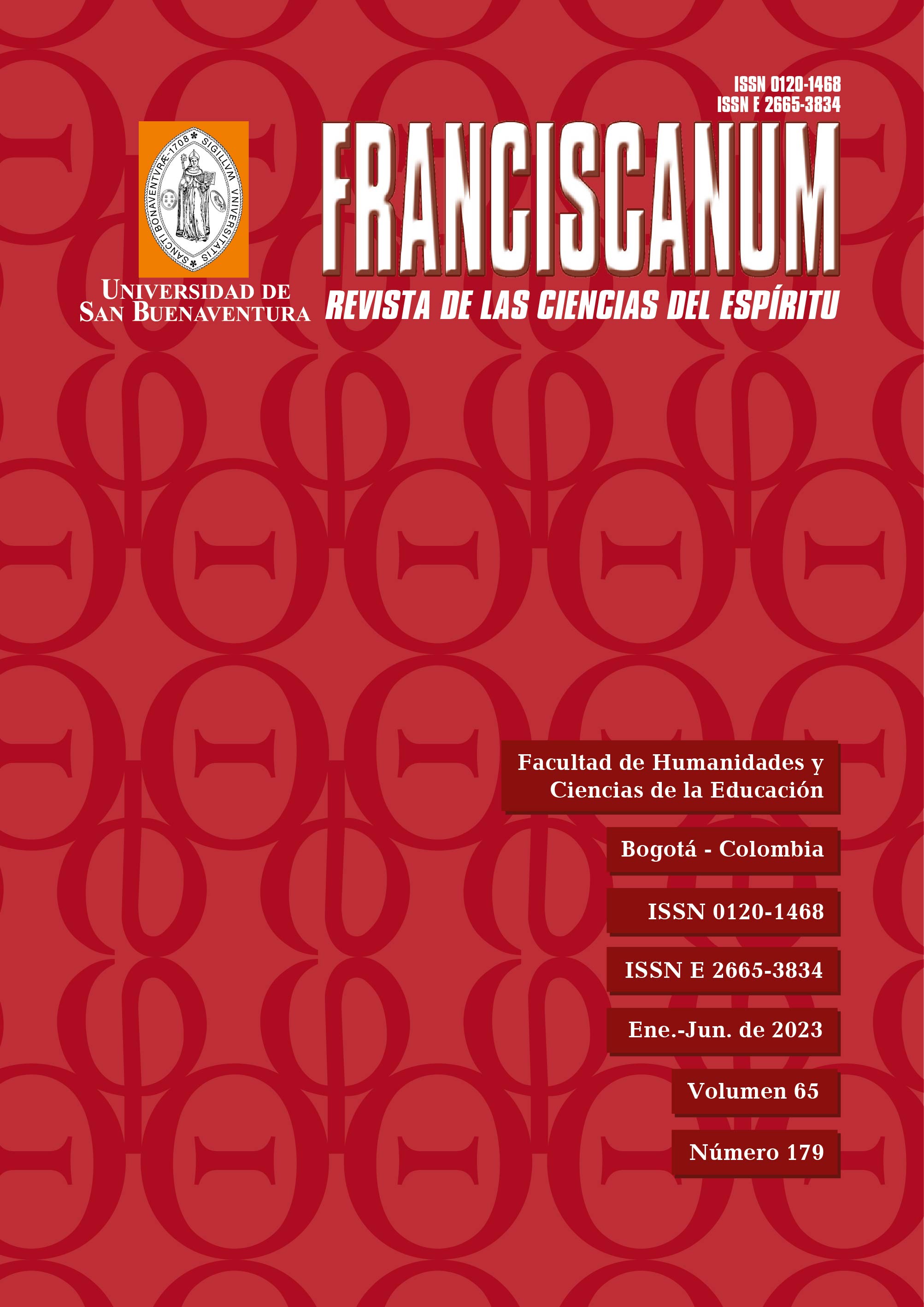This journal provides immediate open access to its content, based on the principle that giving the public free access to research helps a greater global exchange of knowledge.
Therefore, the Creative Commons 4.0 Attribution Attribution - Equal Share (by-sa) License is accepted: The commercial use of the work and the possible derived works is permitted, the distribution of which must be done with a license equal to that regulates the original work.
http://creativecommons.org/licenses/by-sa/4.0/
Along these same lines and in line with the Open Access policy, it is clarified that the authors maintain their rights to articles, without restrictions and, in the same way, they maintain their publication rights, without restrictions. They are only asked to reference the number of the Franciscanum magazine where the article initially appeared.
Abstract
Paul’s personality, intellectual formation and mission make him a man of controversy and originality in his discourse. This article aims to describe: (a) the argumentative structure of the so-called 'letter to Philemon' (Phlm), a text considered to be of Pauline authorship, and (b) the strategic maneuvers developed by the author of the document to resolve the critical discussion, specifically the use of pragmatic politeness. In general, from a dialectical analysis, the letter presents the prisoner's request for Philemon to receive Onesimus back in his house, as well as the arguments that favor this position. By inserting the strategic maneuvers, that is, the pragmatic and rhetorical dimensions, the point of view and the arguments change. Politeness’ strategies help, on the one hand, the community to welcome Onesimus and, on the other hand, for them to learn that Christians have been begotten by their faith in Christ. Therefore, not only the request is declared, but a new truth of faith and an ecclesiological and social practice. Paul safeguards his negative face, appealing to a new style of authority and a renewed form of community life that goes beyond the specific context in which the letter was written. Every man and woman of faith are worthy members of the community because they are "my womb" (Phlm 12b).
References
Austin, John. How to do things with words. London: Oxford University Press, 1962.
Barbosa, João. “O trabalho e a escravidão na visão do apóstolo Paulo,” Fragmentos de Cultura vol. 24, no. 3, (2014): 403-411;
Brown, Penelope y Stephen Levinson. Politeness: Some universals in language usage. Cambridge: Cambridge University Press, 1987.
Caballero, Juan Luis .“Retórica y Teología: Carta a Filemón,” Scripta Theologica 37, (2005): 441-474;
Capes, David “Paul’s Coworkers”. Consultado el 15 de abril de 2022. https://davidbcapes.com/articles/brief-articles/pauls-co-workers/
Cros, Anna. Convencer en Clase: Argumentación y Discurso Docente. Barcelona: Ariel Lingüística, 2003.
De Vos, Craig. “Once a slave, Always a slave? Slavery, manumission, and relational patterns in Paul’s letter to Philemon”. Journal of Study of the New Testament, no. 82 (2001): 89-105.
Eco, Umberto. Lector in fabula. La cooperación interpretativa en el texto narrativo. Barcelona: Lumen, 1981.
Egger, Wilheim. Metodologia do Novo Testamento: Introdução aos métodos linguísticos e histórico-críticos. São Paulo: Loyola, 2005.
Escandell, María Victoria. Introducción a la pragmática. Barcelona: Ariel, 1996.
Fitzmyer, Joseph. The letter to Philemon. New York: The Anchor Bible, 2000.
Grice, Paul. Logic and conversation. New York: Academic Press, 1975.
Higuita, Diego “El mensaje liberador de Pablo en la carta a Filemón”. Realitas, Revista de Ciencias Sociales, Humanas y Artes vol. 2, no. 2, (2014): 22-27.
Légasse, Simón. La carta a Filemón. Navarra: Editorial Verbo Divino, 1981.
Lehmann, Richard. Épître à Philémon. Le christianisme primitif et l'esclavage. Genève: Ed. Labor et Fides, 1978.
Lokkesmoe, Ryan. “Finding Onesimus: Recovering the Story of a First Century Fugitive Slave.” Disertación doctoral, University of Denver and Iliff School of Theology, Denver, 2015.
Miranda, Lidia y Helga Lell. “Coexistencia de instituciones de órdenes normativos contrapuestos en la epístola a Filemón”. Classica, Revista Brasileira de Estudos Clássicos vol. 26, no. 1 (2013): 117-129.
Mora Paz, César. “Dimensión socio-religiosa de la carta a Filemón. Su función comunicativa y su contenido”, Tesis para optar al grado de doctor en Sagradas Escrituras, Pontificio Instituto Bíblico, Roma, 1988.
Mora Paz, César. “Los métodos de Análisis Literario: el método pragmalingüístico”. Medellín 88 (1996): 49-84
Mora Paz, César; Massimo Grilli; y Rainer Dillmann. Lectura pragmalingüística de la Biblia. Teoría y aplicación. Estella: Verbo Divino, 1999.
Ortega, Alfonso. “La hospitalidad en el Nuevo Testamento”. Scripta Fulgentina vol. 16, no. 31-32, (2006): 83-94.
Pereira, Daniel “Além dos limites impostos pela cultura e pelos preconceitos. Pistas para uma releitura da Carta a Filêmon, Apia e Arquipo na perspectiva das masculinidades”. Estudos bíblicos, no. 86, (2005): 37-41.
Reyes, Graciela. El abecé de la pragmática. Madrid: Arco Libros, 1998.
Tolmie, Donald. Philemon in perspective: Interpreting a Pauline letter. Berlin: De Gruyter, 2010.
Van Eemeren, Franz y Peter Houtlosser. “Strategic maneuvering in argumentative discourse: A delicate balance”. En Dialectic and rhetoric: The wharp and woof of argumentation analysis, ed. Franz van Eemeren y Peter Houtlosser, 131-159. Dordrecht: Kluwer Academic Publishers Group, 2002.
Van Eemeren, Franz y Robert Grootendorst. Argumentation, communication and fallacie. A pragmadialectical perspective. N. Jersey: L. Erlbaum, 1992.
Witherington III, Ben. The letters to Philemon, the Colossians, and the Ephesians. A socio-rhetorical commentary on the captivity epistles. Michigan/Cambridge: Eerdmans Publishing, 2007

 Perfil Google Scholar
Perfil Google Scholar


















